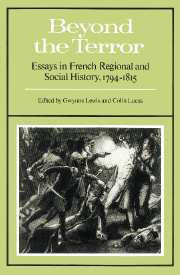Book contents
- Frontmatter
- Contents
- Contributors
- Preface
- 1 Cobb and the historians
- 2 The reconstruction of a church 1796–1801
- 3 Picking up the pieces: the politics and the personnel of social welfare from the Convention to the Consulate
- 4 Conscription and crime in rural France during the Directory and Consulate
- 5 Common rights and agrarian individualism in the southern Massif Central 1750–1880
- 6 Themes in southern violence after 9 thermidor
- 7 Political brigandage and popular disaffection in the south-east of France 1795–1804
- 8 Rhine and Loire: Napoleonic elites and social order
- Index
5 - Common rights and agrarian individualism in the southern Massif Central 1750–1880
Published online by Cambridge University Press: 04 November 2009
- Frontmatter
- Contents
- Contributors
- Preface
- 1 Cobb and the historians
- 2 The reconstruction of a church 1796–1801
- 3 Picking up the pieces: the politics and the personnel of social welfare from the Convention to the Consulate
- 4 Conscription and crime in rural France during the Directory and Consulate
- 5 Common rights and agrarian individualism in the southern Massif Central 1750–1880
- 6 Themes in southern violence after 9 thermidor
- 7 Political brigandage and popular disaffection in the south-east of France 1795–1804
- 8 Rhine and Loire: Napoleonic elites and social order
- Index
Summary
Ever since Marc Bloch's seminal article on the growth of agrarian individualism, the struggle against common rights has been associated with the second half of the eighteenth century. The bureaucrats of the late ancien regime launched the debate, the Revolution resolved it by consecrating the principle of private property. Subsequent regimes had merely to complete the mopping-up operation. That such a linear perspective should have survived for so long despite the nuanced judgements of historians like Henri Sée and Georges Lefebvre and, indeed, Bloch, owes much to the pervasive quality of the revolutionary myth. Few would dispute the claim of the French Revolution to mark the beginning of a new political era, but its impact in the field of economic policy and development calls for careful assessment. As evidence accumulates which casts doubt upon the Revolution as the point of convergence of maturing economic, social and political processes, the old assumptions have been undermined. The champions of 1789 continue to assert its specificity, but with faltering conviction. Arguments are adjusted to acknowledge recent research, but even where this points strongly in other directions the categories of debate and the conclusions remain unchanged. By destroying seigneurial privilege and collective rights the Revolution accelerated the dissolution of the rural community, asserts Albert Soboul.
He concedes that the process was slower in the regions of ‘petite culture’ and accepts that revolutionary legislation was not always implemented; nevertheless he rejects the idea of a ‘compromise’ proposed by Lefebvre and prefers to use the term ‘paradox’ instead.
- Type
- Chapter
- Information
- Beyond the TerrorEssays in French Regional and Social History 1794-1815, pp. 121 - 151Publisher: Cambridge University PressPrint publication year: 1983
- 1
- Cited by



